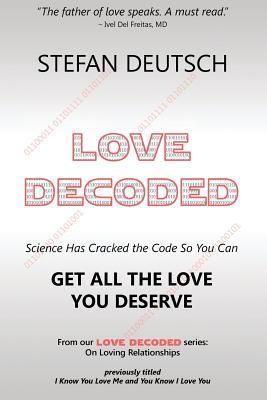One of the things I noticed in my exploration of human development and behavior was that all of us feel deeply hurt whenever we are treated unlovingly or when love is withheld from us. Why does it hurt so much? I began asking myself. Why don't we tell people that we need them to be more loving? Why aren't we always loving to others? These questions came alive for me. When I wasn't busy with tasks that needed my immediate attention, I would find myself looking back at these questions and raising even more. What is love, really? What is loving behavior? How can we get it and give it consistently and unconditionally? Why is that so difficult? Why aren't we more loving to ourselves?
In time, I began to formulate answers and develop ideas. One of my earliest and most important theories was that love is an essential life-sustaining energy that nourishes us, just like air, food, and water. Thirty years later, this finding was finally scientifically validated.
This explains why we need love. Without it, we wither. With it, we thrive. Although everyone is capable of giving love, most of us have a great deal of difficulty giving it consistently. The reason for this is that most of us were never taught how to give and get love consistently and unconditionally. These ideas are so infrequently discussed or studied that most of us have a hard time articulating what love is!
We need to receive love consistently and unconditionally to experience true happiness, wholeness, and fulfilling relationships. When you're starved for love, your ability to make good decisions for yourself and your relationship is compromised.
Love as Nourishment
Understanding the true nature of love is the first step to learning how to give and receive it freely and without condition. Love doesn't come wrapped in a cute little package we can buy for ourselves or hand over like a birthday gift. Have you ever asked yourself what love is? Perhaps not, since we all believe we know. We know what we experience; this powerful energy is felt in every cell of our bodies. We use words like happiness and warmth to convey the experience of love, as well as pain, lethargy, heartache, and depression when we are deprived of it. But these are descriptive terms about how love makes us feel--not what it actually is.
Like plants turning to face the sun, human beings are, in varying degrees, drawn to those who warm them with their love. The warmth that comes from most people some of the time and a few people all of the time nurtures and feeds us. When we receive the life-sustaining energies in air, food, and water, we thrive and feel energized, but when we are deprived of them, we experience physical pain and emotionally die. Similarly, when we receive loving energy, we also thrive
and feel energized, but when we are deprived of love, we experience pain to the point that some people feel they want to die. Isn't Romeo and Juliet, a story of two people willing to die when love is lost, one of our favorite love stories? I've wondered, Could it be that love also contains a life-sustaining energy? An energy that makes us feel like we're raring to go or, when we don't get it, like we can't get out of bed?
Tools For Loving -
Awareness - vision - communication - and unconditional behavior are the 4 developmental tools necessary to be able to love oneself and others unconditionally. The book teaches how these four tools can be developed and then applied in an integrated and sequential manner for richer relationships and optimum well-being.
